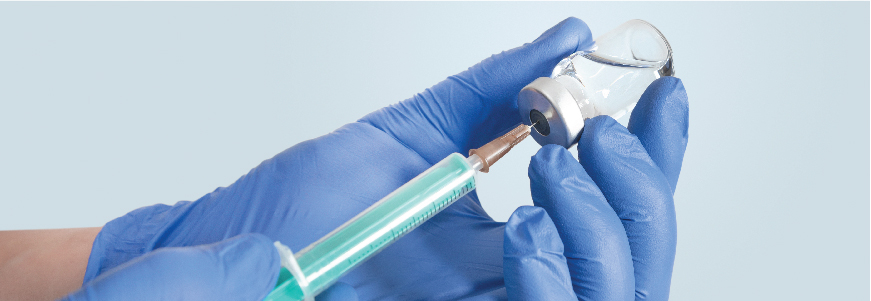Using the mRNA technology that has come to the forefront of vaccine development during the COVID-19 pandemic, Duke researchers are studying whether a new replicating RNA vaccine for breast cancer can potentially trigger a stronger immune response for patients with locally recurrent or metastatic disease.
While traditional COVID-19 mRNA vaccines have demonstrated the ability of RNA vaccines to elicit precise immunity against a viral protein after multiple homologous boosts, a self-replicating RNA vaccine capable of making many copies of itself promises to deliver even stronger responses that are potentially capable of eliciting tumor antigen-specific immunity against advanced cancers.
A Duke-developed vaccine targeting the HER2 protein—the driver of HER2-positive breast cancer and the cause of about 20% of all breast cancer cases—is a central component of a Duke Cancer Institute study led by H. Kim Lyerly, MD, Matthew Morse, MD, and Jeremy Force, MD.
- A Phase 1 trial of this self-replicating vaccine demonstrated safety and HER2-specific memory responses that associated with enhanced progression-free survival. However, pre-clinical studies indicated that tumor immunosuppression could blunt vaccine anti-tumor responses, which were successfully enable by combination with PD-1 inhibition.
- The Phase 2 trial is now examining whether pembrolizumab increases the tumor infiltrating and peripheral blood immune response compared to the vaccine on its own. While the vaccine works to a degree on its own, the tumor can still activate backup strategies for survival. When combined with existing immune checkpoint inhibitors, though, the pre-clinical studies indicated that the one-two punch was highly effective.
Zachary Hartman, PhD, a Duke immunologist and one of the study leaders, offers some insight below about this investigational cancer vaccine and the trial design’s impact on how cancer could be treated in the future.
What types of patients are eligible for this study?
Hartman: This trial is actively accepting qualified participants at Duke. Qualified participants include those with stage 4 metastatic HER2-positive breast cancers who have already completed traditional therapy. Those with hormone receptor-positive or -negative breast cancer can also be included. Importantly, patients can maintain their standard-of-care therapy in addition to the study treatments.
How does the investigational vaccine for HER2-positive breast cancer work?
Hartman: We're using an RNA-based vaccine that is similar to some of the COVID-19 vaccines, but it’s potentially better because it’s a synthetic replicating RNA vaccine. These RNA viruses have two parts: one responsible for RNA replication, and another responsible for making other progeny viruses that spread within the host cells. In this vaccine, we were able to optimize the virus’s replicating nature by extracting the non-replicating parts and replacing them with the HER2 protein, which we then used to make copies to evoke effective anti-tumor immune responses. In Phase 1 of this trial, we found that vaccine-induced HER2-specific T-cells are essential for immune responses in the metastatic patient cohort and that it was more effective to elicit the T-cells early in tumor development.
What do we know so far about how the immune checkpoint inhibitor pembrolizumab enhances the effects of the vaccine?
Hartman: When used alone, pembrolizumab has shown limited benefit for HER2-positive breast cancers. However, by working in tandem, the vaccine primes the immune system to initiate the anti-tumor response, and the immune checkpoint inhibitor then rallies the T-cells to action, resulting in pronounced tumor reduction and enhanced progression-free survival for patients with HER2-specific responses.
How do you see this approach driving future vaccine development in the cancer treatment space?
Hartman: We’ve set a high bar for what we’re trying to do for patients with HER2-positive breast cancer and metastasis, which is to evoke a self-immunity against HER2 and affect the therapeutic outcome. I think that vaccine technologies have proven to be effective against infectious disease and can be utilized to stimulate and direct immunity in patients, but they likely require combination with checkpoint inhibitor and stimulatory drugs to circumvent tumor-associated immune suppression. In the future, I think these approaches will be employed transiently early after a cancer diagnosis to maximize the stimulation of immunity against cancer. Additionally, I think that different types of cancer vaccines could be applied prophylactically to prevent the emergence of resistance mutations in cancer, thus enhancing and prolonging the efficacy of targeted therapies.
Refer patients to this study
Visit https://www.dukecat.com/clinical-trials for more information. See these patient FAQ for additional information.
